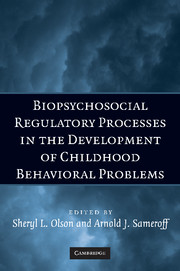Book contents
- Frontmatter
- Contents
- Preface
- Contributors
- 1 Conceptual Issues in Studying the Development of Self-Regulation
- 2 How Gene-Environment Interactions Can Influence the Development of Emotion Regulation in Rhesus Monkeys
- 3 Context Matters: Exploring Definitions of a Poorly Modulated Stress Response
- 4 An Integrative Approach to the Neurophysiology of Emotion Regulation: The Case of Social Withdrawal
- 5 Regulatory Competence and Early Disruptive Behavior Problems: The Role of Physiological Regulation
- 6 Behavior Regulation as a Product of Temperament and Environment
- 7 Self-Regulatory Processes in the Development of Disruptive Behavior Problems: The Preschool-to-School Transition
- 8 Emotional Dysregulation and the Development of Serious Misconduct
- 9 Regulatory Processes in Children's Coping with Exposure to Marital Conflict
- 10 Family Subsystems and Children's Self-Regulation
- 11 Culture and the Development of Regulatory Competence: Chinese–U.S. Comparisons
- 12 Self-Regulation and the Development of Behavioral and Emotional Problems: Toward an Integrative Conceptual and Translational Research Agenda
- Index
- References
3 - Context Matters: Exploring Definitions of a Poorly Modulated Stress Response
Published online by Cambridge University Press: 02 July 2009
- Frontmatter
- Contents
- Preface
- Contributors
- 1 Conceptual Issues in Studying the Development of Self-Regulation
- 2 How Gene-Environment Interactions Can Influence the Development of Emotion Regulation in Rhesus Monkeys
- 3 Context Matters: Exploring Definitions of a Poorly Modulated Stress Response
- 4 An Integrative Approach to the Neurophysiology of Emotion Regulation: The Case of Social Withdrawal
- 5 Regulatory Competence and Early Disruptive Behavior Problems: The Role of Physiological Regulation
- 6 Behavior Regulation as a Product of Temperament and Environment
- 7 Self-Regulatory Processes in the Development of Disruptive Behavior Problems: The Preschool-to-School Transition
- 8 Emotional Dysregulation and the Development of Serious Misconduct
- 9 Regulatory Processes in Children's Coping with Exposure to Marital Conflict
- 10 Family Subsystems and Children's Self-Regulation
- 11 Culture and the Development of Regulatory Competence: Chinese–U.S. Comparisons
- 12 Self-Regulation and the Development of Behavioral and Emotional Problems: Toward an Integrative Conceptual and Translational Research Agenda
- Index
- References
Summary
There are an increasing number of studies assessing the early development of physiological and emotion self-regulation and the risk for psychopathology (Calkins & Dedmon, 2000; Calkins & Fox, 2002; Keenan, 2000; Shaw et al., 1997). The capacity to regulate emotion and behavior in early childhood has been shown to be extremely important in the development of adaptive and appropriate social behaviors in the preschool and school years (Calkins, 1994; Eisenberg et al., 1995, 1996). Children of parents with psychopathology are at greater risk for psychopathology and even in their infancy can exhibit behavioral differences from other children (Cohn & Tronick, 1983; Field, 1995).
Developmental psychopathology is a discipline that is organized around the incorporation of developmental principles into the study of the etiology of psychopathology. The program of research described in this chapter is informed by this framework and as a result is focused on this question: How early can we tell that a child is on a pathway toward deficient behavioral and emotional functioning? We propose that poorly modulated responses to stimuli in the first months of life may indicate risk for the development of later behavioral and emotional problems. In this chapter we present an overview of the theoretical underpinnings of this program of research, descriptive data on individual differences in the neonate's cortisol response to two different stressors, and an examination of the relations between behavior and cortisol response, with the goal of exploring how to operationally define suboptimal patterns of stress reactivity in human infants.
Information
- Type
- Chapter
- Information
- Biopsychosocial Regulatory Processes in the Development of Childhood Behavioral Problems , pp. 38 - 56Publisher: Cambridge University PressPrint publication year: 2009
References
Accessibility standard: Unknown
- 1
- Cited by
